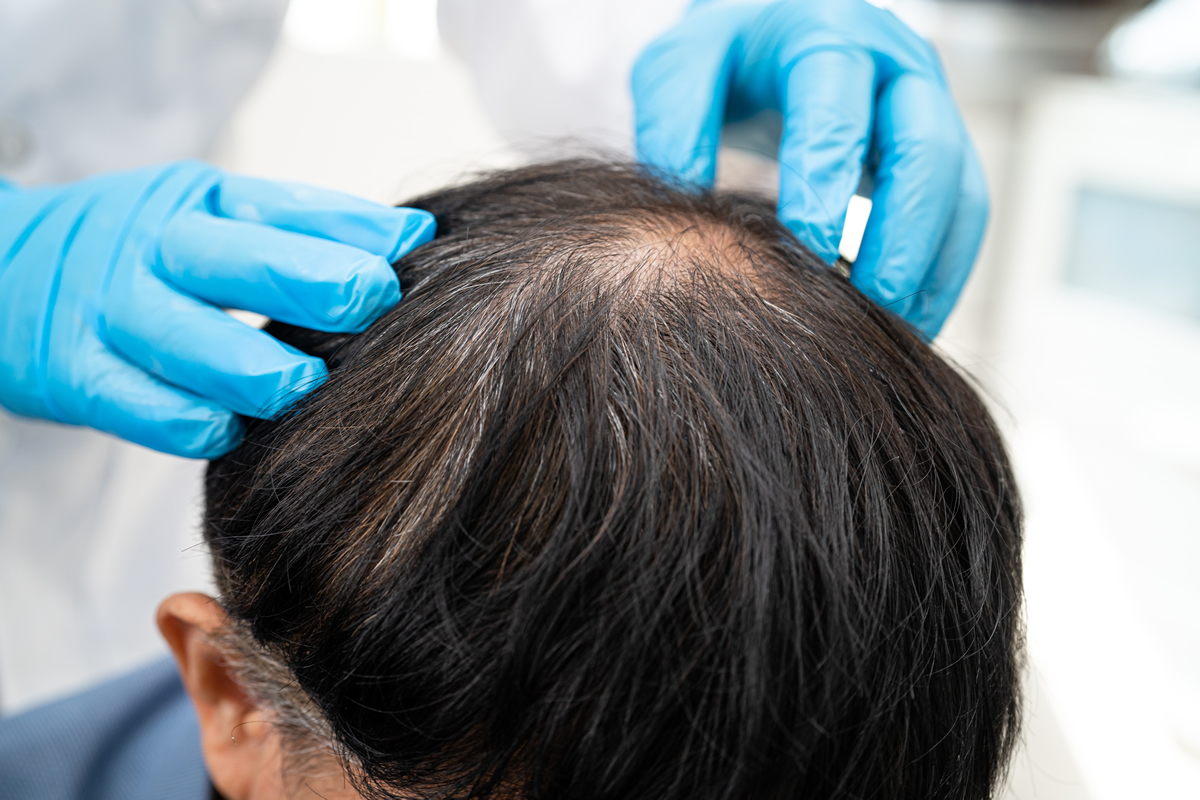Hair loss: Why is my hair falling out and what tests should I have?
1. What is Hair Loss?
Hair loss is a natural phenomenon of the body that concerns all of us during our lives, both women and men. It can appear periodically, seasonally, or develop into a more intense and permanent condition, affecting not only appearance but also the self-confidence of those experiencing significant hair loss.
It’s important to clarify that we all lose 50-100 hairs daily, but when does this loss exceed normal limits and why do our hairs fall out?
In reality, hair loss is not always a cause for concern. The body regularly renews its hair. However, when hair loss becomes intense or prolonged, it may be a sign that something is not right, either at the level of nutrition, hormones, or genetic predisposition. This is where proper evaluation and, if necessary, specialized tests are needed.
2. The Hair Life Cycle
To understand why our hair falls out, we must first know how hair “lives” and develops on our scalp. Each hair goes through three main phases: the anagen, catagen, and telogen phases.
In the anagen phase, the hair is in a growth phase, which can last from two to six years. In the catagen phase, growth stops and the hair prepares to fall out, while in the telogen phase, the hair separates from the hair follicle to make way for a new one. It’s a continuous renewal cycle.
When this cycle is disrupted either by internal factors such as hormones or external factors such as stress, we observe more intense hair loss. Understanding this cycle is the first step in properly addressing hair loss and not panicking at the first hair we see on our pillow.
3. What are the Symptoms of Hair Loss?
i) Gradual Thinning
One of the most common signs of hair loss is the gradual thinning of hair in various areas of the scalp. In men, loss typically begins at the hairline and crown, often forming a characteristic “M” pattern. In women, the hairline remains relatively stable, but hair density decreases throughout the scalp, creating the impression that hair is “thinning” everywhere.
ii) Localized Loss in Circular Areas
Others show sudden thinning in small, circular areas, usually the size of a coin. These “gaps” can appear on the head, beard, or even eyebrows. Sometimes preceded by a feeling of itching or skin discomfort before hair loss begins. These symptoms, especially when sudden, warrant immediate evaluation by a specialist.
iii) Sudden and Intense Hair Loss
There are cases where, following intense stress or physical shock, sudden hair loss is observed. Many describe that “clumps” fall out when washing or combing, which can be frightening. This intense hair loss is not necessarily related to permanent loss but indicates that the body has undergone an intense change or dysfunction.
4. What are the Causes of Hair Loss?
Why is my hair falling out? This is perhaps the most common question asked when someone notices their hair appearance changing. The truth is that hair loss can be due to many different factors, from something simple and temporary to something more complex that requires medical investigation. There is no single answer, which is why proper diagnosis is the first and most crucial step.
i) Genetic Factors
One of the most common causes is heredity. If there is a family history, you are likely to experience androgenetic alopecia, a form that develops gradually and is related to genes and hormonal balance. In this case, hair thinning usually begins from the top of the head and progresses slowly over time.
ii) Hormonal Changes and Conditions
Hormonal tests for hair loss are often necessary in women, especially when hair loss appears suddenly. Conditions such as hypothyroidism, polycystic ovary syndrome (PCOS), pregnancy, or menopause can cause either temporary or long-term hair loss. This is why it’s important to check the hormonal profile in collaboration with a doctor when dealing with female hair loss.
iii) Diet & Deficiencies
If you’re wondering “what tests should I do for hair loss,” a diet poor in nutrients such as iron, vitamin D, or zinc can lead to intense hair loss. Iron deficiency, especially in women, is one of the most common causes of excessive hair loss and hair shedding. This is why blood tests are important.
iv) Stress and Psychological Factors
Chronic or intense stress can lead to sudden hair loss. The body reacts and hair temporarily stops growing, leading to hair loss with a 2-3 month delay after the event.
v) Seasonal Changes and External Factors
Often the question is asked “which season do hairs fall out?” Mainly in autumn and spring, more hair loss is observed, which is related to the hair life cycle. Hair loss during these periods is often temporary and doesn’t require panic but observation.
vi) Pharmaceutical Treatments & Skin Conditions
Sometimes, hair loss is a side effect of medications, such as antidepressants, treatments for hypertension, or even chemotherapy. Also, skin conditions such as psoriasis or seborrheic dermatitis can cause thinning in the hair, especially at the crown of the head.
5. What Tests Should We Do?
If hair loss continues, a dermatologist or endocrinologist may suggest the following tests:
Complete Blood Count (CBC)
Iron – Ferritin
Thyroid Hormones (TSH, T3, T4)
Vitamin D, B12
Hormonal control in women with hair loss (e.g., for androgens, estrogens, depending on medical history)
Scalp Analysis (Digital Dermatoscopy)
These tests give a clearer picture of what’s really happening in your body.
6. Conclusion
Hair loss can worry you, and that’s completely understandable. However, there are ways to understand what’s happening and solutions that are accessible. Your body sends you signals, and you can listen to them and act with knowledge, not fear. If something concerns you, seek help because it’s the strongest step you can take to take care of yourself.
